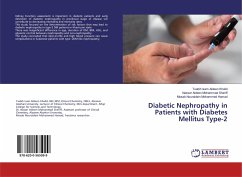
Inflammation during Stem Cell Therapy in Diabetes Mellitus
Versandkostenfrei!
Versandfertig in 6-10 Tagen
41,99 €
inkl. MwSt.

PAYBACK Punkte
21 °P sammeln!
Diabetes mellitus (DM) is the seventh greatest cause of mortality and one of the major worldwide health problems of the twenty-first century. DM is also a major risk factor for cardiovascular disease (CVD), which is the leading cause of mortality in people with diabetes. Aside from the well-known microvascular consequences of diabetes, such as nephropathy and retinopathy, there is an increasing epidemic of macrovascular problems, such as disorders of the coronary arteries, peripheral arteries, and carotid vessels, especially among type II diabetic patients. Cytokines are low-molecular-weight e...
Diabetes mellitus (DM) is the seventh greatest cause of mortality and one of the major worldwide health problems of the twenty-first century. DM is also a major risk factor for cardiovascular disease (CVD), which is the leading cause of mortality in people with diabetes. Aside from the well-known microvascular consequences of diabetes, such as nephropathy and retinopathy, there is an increasing epidemic of macrovascular problems, such as disorders of the coronary arteries, peripheral arteries, and carotid vessels, especially among type II diabetic patients. Cytokines are low-molecular-weight extracellular proteins that function as immune response mediators. They function in extremely complicated pathways that govern the inflammatory process, and they are required to carry out the immune response. Low-grade chronic inflammation and innate immune system activation have been related to the development of DM. Pro and anti-inflammatory cytokines have been linked to the development of diabetes. Previous research has shown that certain pro- and anti-inflammatory cytokines can inhibit insulin-responsive glucose absorption and increase insulin resistance.












